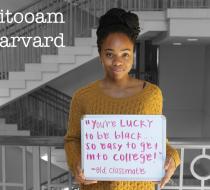‘I, Too, Am Harvard’: Black students show they belong 1 Favorite
hat’s it like to be black at Harvard? Students at the Ivy League university are offering a picture of their experiences there with a play and a photo campaign called “I, Too, Am Harvard,” a nod to the famous Langston Hughes poem.
The play, written and directed by sophomore Kimiko Matsuda-Lawrence, is based on interviews with more than 40 Harvard students who identify as black and have a wide range of backgrounds, including international and multiracial students. Matsuda-Lawrence, who is black and Japanese, said the idea came came out of discussions among members of Kuumba, a historic black organization at Harvard. Students often spoke about feeling alienated on Harvard’s campus or being the only black student in some of their classes, but they felt uncomfortable addressing some of the issues outside of those discussions.
That discomfort came up during Matsuda-Lawrence’s interviews, which started last fall. ”A lot of people said ‘I’ve never told anyone this before’ or ‘I’ve never been able to talk about this,’” she said. “It was almost like a therapy session for both of us.”
As promotion for the play, Carol Powell, also a sophomore at Harvard, took photos of students pictured with racially insensitive, often humiliating remarks made by their peers, as well as would-be responses to them, written on a collegiate staple — the dry-erase board.
“No, I will not teach you how to ‘twerk,’” one reads. ”Don’t you wish you were white like the rest of us?” reads another, attributed simply to “old friend.” More than one sign references the N-word.
The group posted the photos to a Tumblr page, which launched Saturday. By Monday, many of the photos had gone viral. Buzzfeed published 21 of them.
The campaign channels the same assertion of belonging that Hughes’s poem did, said Tsega Tamene, a junior at Harvard and a producer of the play. And the message resonates far beyond Harvard. Students say they have received an outpouring of support from students at other universities, including Yale, Duke, the University of Pennsylvania and even Oxford.
“It’s just evidence of how universal this experience is,” Tamene said.
The project echoes campaigns at other universities, where students of color are calling attention to their experiences on campus. Last fall, University of Michigan students launched a social media campaign called Being Black at the University of Michigan, tweeting with the hashtag #BBUM. According to the New York Times, the campaign was started after one of the fraternities on campus planned a party dubbed “Hood Ratchet Thursday.” The campaign has gained national attention amid declining minority enrollment at Michigan and inspired similar discussions at other schools, including Georgetown. Students at UCLA’s law school released a video last month in response to low enrollment numbers for black students and also have circulated a petition highlighting some of their concerns.
“We’re participating in this . . . greater movement of black student activism around the nation,” Matsuda-Lawrence said.
In a video promoting the play, Matsuda-Lawrence references a column that ran in the student newspaper, the Harvard Crimson, in the fall of her freshman year. Titled “Affirmative Dissatisfaction,” the column took a strong stance against affirmative action on the heels of Abigail Fisher’s Supreme Court case, which challenged the admissions policy of the University of Texas at Austin.
Many black students viewed the column as an attack, Tamene said. “It just created a tense atmosphere on campus, specifically for students of color. It was an an op-ed piece, but it was very strongly questioning our presence on campus.”
Matsuda-Lawrence said that the column came up — unprompted — in many of her interviews with students. And while it was not the impetus for the campaign, Matsuda-Lawrence acknowledged that the column — and the lack of response by Harvard’s administration — was part of a larger issue of students of color feeling like their voices were unheard on campus.
“We don’t need to defend ourselves. We know that we deserve to be here,” she said.
The play, which sold out Tuesday, will premiere Friday as part of Kuumba’s annual Black Arts Festival.
From there, the group hopes to start “an active dialogue” with Harvard’s administration and is interested in working with students from other schools. Matsuda-Lawrence said the campaign team has heard from high school students and received requests to screen the play from leaders of minority programs at predominantly white universities.
“It’s very exciting how this has gone national and inspired people to raise their voices, too,” Matsuda-Lawrence said.
Source:
http://www.washingtonpost.com/blogs/she-the-people/wp/2014/03/05/i-too-a...







